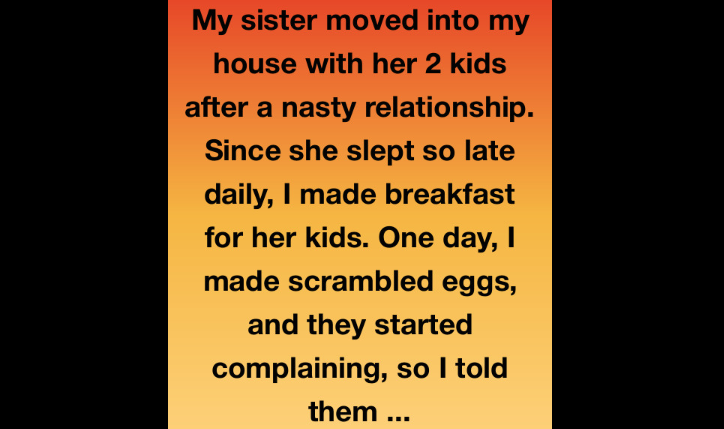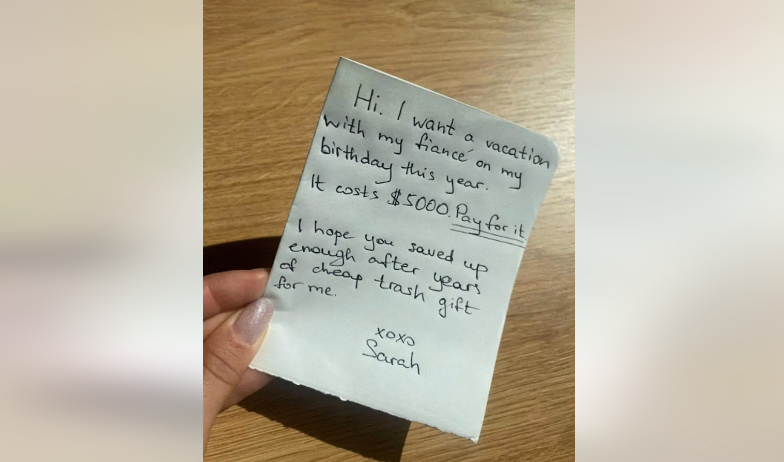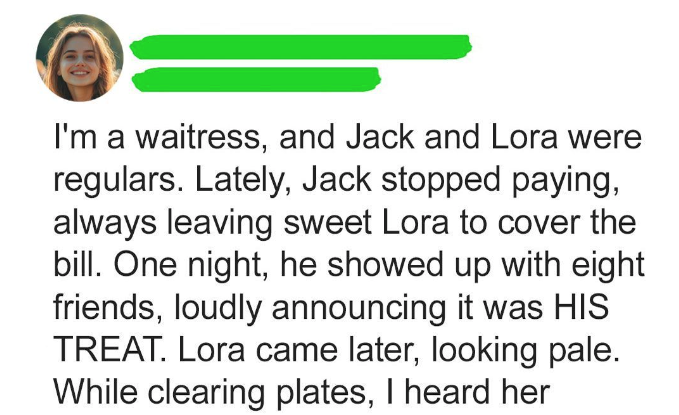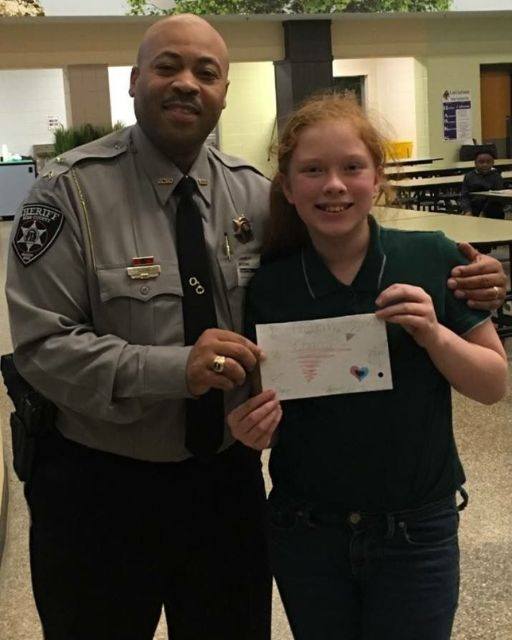My sister, Rae, arrived at my doorstep with her two children, seeking refuge after a painful relationship. Since she often stayed up late into the night, I took on the task of preparing breakfast for her kids. One morning, I whipped up scrambled eggs, only to hear complaints from the children. I looked at them and said, “This is today’s menu. If it’s not to your taste, join me tomorrow, and we’ll cook something you love.”
Their noses wrinkled in disapproval, but they didn’t argue further. Cooking for kids was new to me, especially for ones carrying the weight of tough times. I figured their complaints were a small outburst, so I let it slide without taking offense.
The following morning, I rose earlier than usual and found Max, the younger one, already in the kitchen. His small hands rested on the counter, as if he’d been waiting for me.
“I want to help,” he said, rubbing sleep from his eye.
I grinned. “Alright, Chef Max. What’s on the menu today?”
“Pancakes!” he declared with a wide smile.
So, we made pancakes. Max stirred the batter, getting some on his nose in the process. I let him flip a pancake, which ended up folded and slightly charred. He dubbed it a “dinosaur pancake” and beamed with pride.
Lila, his older sister, came downstairs later, surprised to see the pancakes. She sat quietly and ate without a single complaint. That morning, I heard their laughter for the first time in weeks.
Our days began to settle into a rhythm. I’d wake early, cook breakfast with Max, and sometimes Lila would join us. Rae, their mother, would rise around noon, murmuring a “thanks” as she poured her coffee and sat at the table, distant from the world.
I gave her space, knowing she needed time to heal.
One afternoon, Max brought home a drawing from school—a crayon sketch of our house with all of us in it. He’d labeled me “Uncle Dad.” I chuckled, though the words tugged at my heart.
That evening, I showed the drawing to Rae. She gazed at it for a long moment before saying, “He never called his real dad that. Not once.”
I nodded, at a loss for words.
In the weeks that followed, I noticed small signs of their struggles. Max woke from nightmares, sometimes screaming. Lila’s teacher shared that she’d stopped speaking in class. Rae drifted through the days, leaning on coffee and silence whenever we tried to connect.
One night, I heard Lila crying in her room. I knocked softly, then eased the door open. She was curled under her blanket, trembling.
“You okay, sweetie?” I asked, sitting gently on her bed.
Wiping her face, she whispered, “I miss my room. I miss when Mommy used to sing to us. She doesn’t anymore.”
I stayed until she drifted off to sleep. The next day, I told Rae, “Your kids need you.”
She stared at me and said, “I’m not what they need right now.”
Frustration crept in. “No one expects perfection. Be there. Sit with them. Talk to them.”
She looked away, her voice barely audible. “You don’t know what it’s like to feel worthless every day.”
I paused. She was right—I didn’t know. But her kids needed her, not me.
I gave her time. I kept cooking breakfast, kept showing up. A few days later, Rae was up before noon. She helped pack the kids’ lunches and even braided Lila’s hair.
That day, Lila came home smiling.
“Mom did my braid,” she told her teacher. “It’s not perfect, but I love it.”
That evening, Rae cooked spaghetti. The garlic bread was burnt, but we didn’t mind. We sat together, ate, and laughed about the charred bread.
It wasn’t flawless, but it felt authentic.
Then one Saturday, their father appeared unexpectedly.
I opened the door to find him standing there, smug, wearing sunglasses and holding cheap gas station flowers.
“I’m here to see my kids,” he said.
Every instinct urged me to block him, but legally, I had no grounds to refuse.
Rae froze when she saw him. Lila hid behind her. Max looked puzzled.
He knelt, arms open, but the kids stayed still.
Rae found her voice. “You need to leave.”
He stood, irritated. “They’re my kids.”
“You lost that privilege when you made them fear you,” she said, her voice trembling but firm.
He tried to push past me, but I stood my ground. He didn’t enter.
He left, yelling about lawyers. We never heard from him again.
That night, Rae broke down, sobbing on the porch. I sat beside her, holding her hand.
“I thought I was weak for staying so long,” she said.
“You were strong for leaving,” I told her.
The months that followed were a blend of progress and challenges. Rae began therapy, and so did the kids. I continued being “Uncle Dad.” Max kept drawing, and Lila started writing stories.
Then, in spring, Rae received a job offer to teach art at a community center two hours away.
She hesitated. “I’m not sure we’re ready to leave.”
“Are you ready to grow?” I asked.
She nodded slowly.
A month later, they moved out. The house felt too quiet without them.
But every Sunday, they returned. Pancakes, stories, messy hair, and laughter filled the air. Rae seemed lighter, the kids livelier in the best way.
One Sunday, Rae handed me an envelope. Inside was a card that read: “To the man who showed us what safe feels like.”
I teared up, unprepared for such gratitude.
Weeks later, Lila won a school short story contest. Her story described “a house with burnt toast, lumpy pancakes, and a man who didn’t have to be a dad to act like one.”
Max, naturally, drew a picture of the same scene.
Life had transformed. Rae and her kids weren’t just my family by blood—they were my family in the deepest sense.
Here’s the unexpected part: I thought I’d given them everything, but they gave me something I hadn’t realized I lacked.
I’d lived alone for years—work, gym, sleep, repeat. I thought I enjoyed the quiet.
But after they left, I missed the chaos. The noise. The burnt garlic bread.
So, I began volunteering at a local shelter for women and children rebuilding their lives. I started small—reading to kids, helping with homework. Over time, I became someone they relied on.
A woman named Carla once told me, “You’re the first man my daughter’s not afraid of.”
That struck me deeply, humbling and honoring me.
My life changed because three people entered it during their darkest moment. They brought a love that didn’t just fill my home—it filled my heart.
Rae still calls when she’s overwhelmed. Lila sends me jokes by text. Max mails me dinosaur pancake drawings.
Recently, I visited their new home. Lila had a sign on her bedroom door: “Creative Zone – Knock Before Entering.” Max had a bunk bed and insisted I climb to the top, just like old times.
We made spaghetti again. This time, Rae didn’t burn the bread.
Afterward, we sat outside, watching the kids chase fireflies. Rae turned to me and said, “I never thanked you properly.”
I smiled. “You’re here. You’re healing. That’s enough.”
She nodded, then added, “I want to help women like me. Someday, I want to open a place where they can go when they have nowhere else.”
I promised to help however I could.
Because family isn’t only about blood. It’s about who stands by you when the world feels dark and you’re too weary to stand alone.
It’s pancakes, imperfect braids, and late-night porch conversations.
It’s a quiet love that doesn’t need grand gestures—just presence, reliability, and kindness.
Life doesn’t always unfold as planned. But in its messiest moments, we often find the most profound connections.
If you’ve ever been there for someone—or had someone be there for you—share this story. Like it. Pass it on.
Because someone out there might need to know that even after the darkest nights, the dawn still comes.




